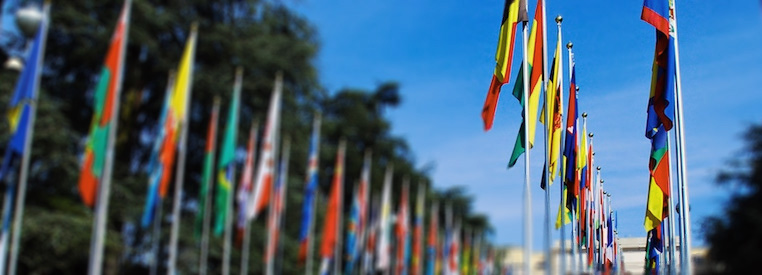U.S.| Clinton’s defense of a human rights approach
From the New York Times:
The Obama administration on Monday laid out a human rights agenda that recognized the limits of American authority: emphasizing the need for change within countries, defending engagement with adversaries like Myanmar and Iran and asserting that differences with big countries like China and Russia are best hashed out behind closed doors.
“We must be pragmatic and agile in pursuit of our human rights agenda, not compromising on our principles, but doing what is most likely to make them real,” Secretary of State Hillary Rodham Clinton said in a wide-ranging address at Georgetown University.
Mrs. Clinton’s remarks came a week after President Obama, in accepting the Nobel Peace Prize in Oslo, warned that there would be consequences for countries that brutalize their own people. Together, the speeches appeared to be an attempt to answer critics who say the Obama administration has not staked out a forceful position on human rights. [...]
Mrs. Clinton also defended the administration’s reluctance to publicly chide China and Russia for human rights abuses, given the range of other strategic interests the United States has with both countries. Public opprobrium, she implied, was better left for small countries. [...]
Human-rights groups harshly criticized Mrs. Clinton for sidelining human rights issues on her first visit to China last February. Other critics have voiced frustration with the administration’s policy toward Sudan, an approach that they say offers more incentives than prods to a government whose leader has been charged with crimes against humanity because of the genocide in Darfur.
Last Thursday, a group of human rights advocates met with Mr. Obama’s national security adviser, Gen. James L. Jones, to express their concerns.
On Monday, Mrs. Clinton said, “We must continue to press for solutions in Sudan where ongoing tensions threaten to add to the devastation wrought by genocide in Darfur.” She insisted that the administration would seek to protect ethnic minorities in Tibet and the Xinjiang region in China, as well as people who signed Charter 08, a manifesto that calls for democratic reform in China.
[...]
More here.
China| Charter 08’s Liu Xiaobo faces 15 years in prison
From the Guardian:
One of China’s leading dissidents has been charged with “inciting subversion”, and faces a possible 15-year jail sentence, amid growing international outrage over his detention and forthcoming trial.
Liu Xiaobo was one of 300 democratic activists in China to author a bold call for constitutional reform last December. The manifesto was published under the name Charter 08, and called for greater freedom of expression, multi-party elections and independent courts. Seen as a figurehead for the movement, Liu was taken into detention shortly before the document was published online. Then, in June, he was formally arrested on suspicion of incitement to subvert state power.
In the latest development – which came on International Human Rights Day, a year and a day after the charter’s publication – officials told Liu’s lawyer they would charge him. He will almost certainly be convicted and sentenced to jail, say experts, probably within weeks.
“The timing is not coincidental,” said Joshua Rosenzweig of the Dui Hua Foundation, which supports political prisoners. “It draws attention away from commemorating the document and says: ‘Look, you want to talk about Charter 08? This is what it gets you.’?” [...]
More here.
China| Political activist Liu Xiaobo facing subversion charges
From BBC:
Chinese police have recommended that prosecutors formally charge top dissident Liu Xiaobo with inciting subversion, his lawyer has said.
Mr Liu has been detained for a year without charge.
Mr Liu was detained on 8 December 2008 after co-authoring Charter 08, a manifesto urging political reform.
The likely charge of “inciting subversion to state power” is routinely used against anyone criticising the Chinese Communist Party.
“The public security organs feel the [prosecutors] should charge him and have recommended that they do so,” Mr Shang said after seeing a copy of the recommendation.
“It is two-fold. One part relates to Charter 08 while the other relates to articles of his posted on the internet after 2005,” Mr Shang said. [...]
More here.
China| “Charter 08 in China, One Year On”
Op-ed from Wall Street Journal on Charter 08.
A year ago, on the 60th anniversary of the unveiling of the Universal Declaration of Human Rights, 303 Chinese announced “Charter 08,” a citizens’ manifesto calling for constitutional democracy, human rights, rule of law and tripartite separation of powers in government. It was the first public statement in the history of the People’s Republic of China to call for an end to one-Party rule. “The Chinese people, who have endured human rights disasters and uncountable struggles across these same years, now include many who see clearly that freedom, equality, and human rights are universal values of humankind and that democracy and constitutional government are the fundamental framework for protecting these values,” the Charter states.
Its drafters took inspiration from Charter 77 in Czechoslovakia, but their document also shows influences from the U.S. Constitution, the French Declaration of the Rights of Man, the democratic movement in Taiwan in the 1980s, and the Truth and Reconciliation Commission in South Africa. Eventually more than 10,000 people inside China signed on to it, and countless others who read it feared to sign. Google hits for “08 xianzhang” in Chinese reached a million.
Meanwhile the government in China sought to treat Charter 08 as a nonevent. It has banned mention of the Charter on the Internet and, except for a very brief negative comment of its own, has purged it from state media as well. But this silence is unnatural and the nonchalance feigned. We know this because of strong evidence of behind-the-scenes repression. [...]
More here.
